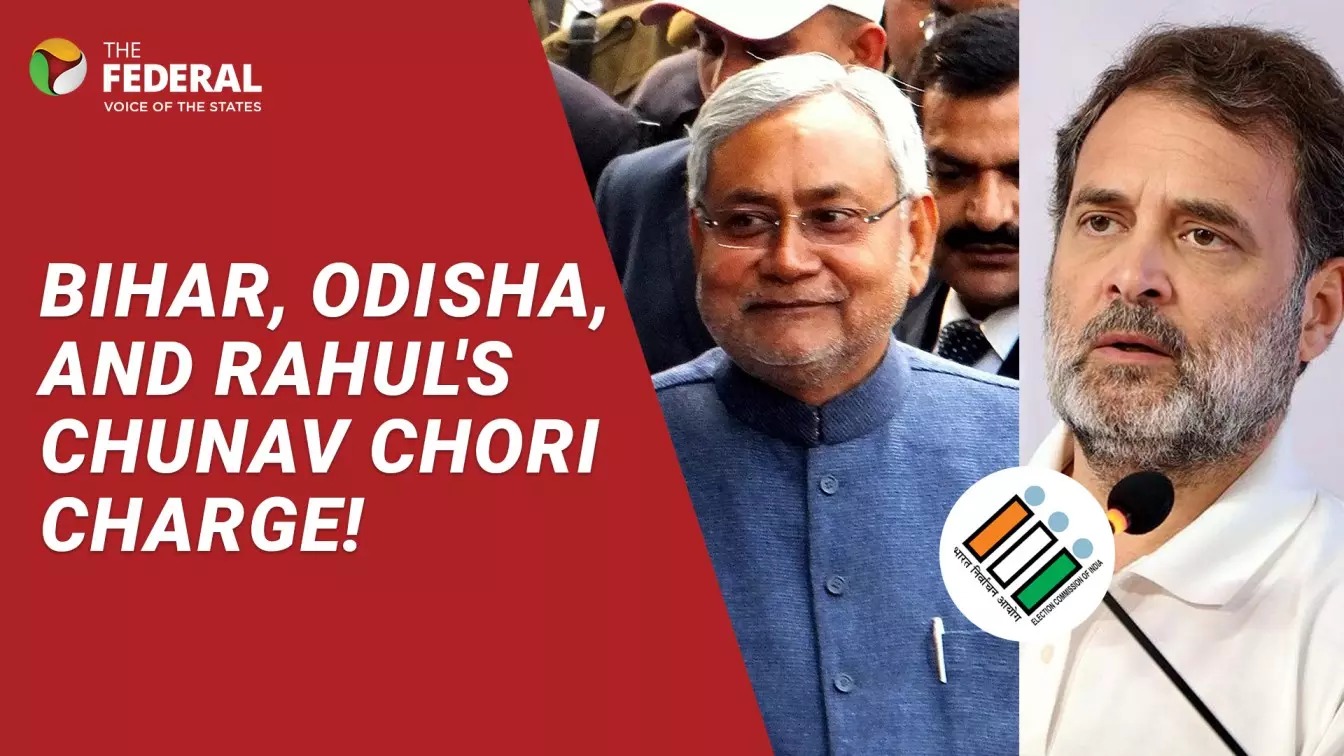
Rahul claims Bihar polls being 'hijacked like Maharashtra'; is he right?
Rahul Gandhi alleges attempts to rig Bihar’s upcoming elections, likening it to Maharashtra while blaming the BJP and the Election Commission for “backdoor entry” tactics

A day after the Supreme Court cleared the way for the Election Commission to proceed with the Special Intensive Revision (SIR) of electoral rolls in Bihar, Leader of Opposition Rahul Gandhi on Friday accused the BJP of attempting to hijack the elections in the poll-bound state, similar to what he claimed happened in Maharashtra. In an interview with Shweta Tripathi, The Federal’s Political Editor Puneet Nicholas Yadav explores what’s at stake for Bihar’s political future.
The Supreme Court has allowed the SIR process to continue despite these concerns. What exactly was the court order?
Yes, the Supreme Court has allowed the process to continue, but not without crucial caveats. Initially, the Election Commission listed 11 documents that would be accepted to verify voter eligibility. However, this list was problematic. For instance, it included the NRC certificate, which is applicable only in Assam, and left out commonly held documents like Aadhaar, ration cards, and even the voter ID card itself.
Also read | Bihar voter roll revision: Why EC move could stir up the melting pot
The petitioners, including ADR, Mahua Moitra from Trinamool Congress, Manoj Jha from RJD, activist Yogendra Yadav, PUCL, and a coalition of INDIA bloc parties, argued that these exclusions would unfairly disenfranchise large sections of voters, especially in a poor state like Bihar with low passport penetration (only around 2.5–3.5%).
The Supreme Court agreed to an extent. It directed the EC to also consider Aadhaar, voter ID, and ration cards as valid documents. It further barred the publication of even draft electoral rolls until the next hearing on July 28. Importantly, the petitioners have the liberty to seek a stay on the entire process during that hearing.
Does this count as a win for the Opposition or the Election Commission? Both sides seem to be claiming victory.
It depends on the lens through which you view it. The Opposition can certainly claim a partial win. They managed to get three key documents added to the list and secured an assurance that revised rolls won’t be published until the court’s further directions. Also, the possibility of a stay on the process remains open.
At the same time, the Election Commission and the BJP are portraying it as their win because the SIR has not been halted. The EC is now saying their original list wasn’t exhaustive and that they always intended to consider other documents like voter ID, as the form already includes the voter ID number.
The Supreme Court, in its oral observations (though not in the final written order), told the EC to "consider" Aadhaar, voter ID, and ration card, not necessarily "accept" them. In legal terms, that wording leaves a lot of room for discretion. So, while the EC must justify any rejection, it still has some leeway.
Given all this, is the Opposition’s message that this is a fight between democracy and authoritarianism, resonating with voters?
There are two aspects to this. First, the question of whether people believe their electoral mandate is being stolen. From my ground reporting, especially during previous elections in Maharashtra and Haryana, many voters, particularly those opposed to the BJP, did express doubts about whether their votes truly mattered. In early phases of the Lok Sabha elections, low voter turnout was partly linked to this sentiment.
That said, this current controversy is not just about EVM manipulation but something far more serious: the alleged deletion or manipulation of voter identities themselves. It hits at the heart of democratic participation.
However, the second aspect is electoral impact. While the doubts may exist, it’s unclear whether this narrative can mobilise large-scale voter behaviour in favour of the Opposition. In fact, in some cases, it could depress turnout among those who fear their votes won’t count, which ironically hurts the Opposition more.
How has the SIR process played out in other states, and what are the broader implications for poll-bound regions?
This is the first SIR in Bihar since 2003, so it's a significant event. The Opposition fears that similar revisions may soon happen in other states. Unlike a Summary Revision (SR), which took place in January, an SIR is far more intensive and potentially more exclusionary.
In Bihar, the timing has raised serious concerns. The EC issued the SIR order on June 24, and the process began on July 1, barely months before the expected elections in October–November. Out of the 8 crore voters, 4.9 crore were part of the 2003 SIR and are largely considered safe. But the over 3 crore voters added since then have to now submit fresh documentation.
Also read | EC’s Bihar SIR inconsistent with law, raises many questions: PDT Achary
In a state as impoverished and disaster-prone as Bihar, where floods, displacement, and mass migration are common, especially in the Kosi and Seemanchal regions, expecting such communities to readily produce documents like passports or matriculation certificates is unrealistic. Many live in kuccha homes that are frequently destroyed, and their documents, if they ever had them, are likely lost.
That’s why the fears are so intense, because the very architecture of democracy in these regions could be weakened through what appears to be a bureaucratic exercise but carries significant political consequences.
(The content above has been generated using a fine-tuned AI model. To ensure accuracy, quality, and editorial integrity, we employ a Human-In-The-Loop (HITL) process. While AI assists in creating the initial draft, our experienced editorial team carefully reviews, edits, and refines the content before publication. At The Federal, we combine the efficiency of AI with the expertise of human editors to deliver reliable and insightful journalism.)

